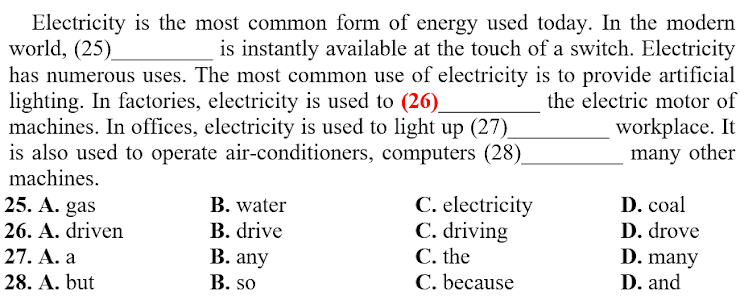Read the following passage and mark the letter A, B, C or D on your answer sheet to indicate the correct word or phrase that best fits each of the numbered blanks.
THE FOUR-YEAR SPREAD OF BUBBLE TEA ACROSS THE UK
Four years ago bubble tea was relatively unknown in the UK, but the drinks are now ubiquitous on High Streets, from cities to small towns, writes Lucy Townsend.
It is often brightly coloured, sometimes served with milk, with a layer of jelly-like globules - tapioca balls - that settle (23) …………. the bottom of the cup. Drunk through an extra thick straw with a spoon-shaped tip, it is a mouthful of tea and chewiness - both a drink and a snack.
Chorley in Lancashire got its first bubble tea bar in July. Huddersfield has ‘Bubble n Shake’, there is a mobile bubble tea van in Bristol, and it can be (24) ……………. in cities from Glasgow to Portsmouth.
Bubble tea hails from 1980s in Taiwan. It was an evolution from the country's street tea vendors (25) …………….. began experimenting with fruity flavours and colour to entice customers. The “bubble” actually (26) ………….. the froth on top of the drink which comes after it is violently shaken - some cafes use a machine especially for shaking. How the tapioca balls arrived in the drink is a matter of debate - though the most common story is that product development manager Lin Hsiu Hui (27) ………….. sitting in a staff meeting and poured the tapioca from her pudding into her Assam iced tea. The result was considered delicious.
While growing in the UK, bubble tea is even more popular in Germany, according to the market research firm Mintel. Even McDonald's has started serving it.
23. A. down B. in C. at D. out
24. A. discovered B. found C. searched D. sought
25. A. which B. where C. who D. whom
26. A. stands for B. regards to C. describes D. refers to
27. A. have been B. is C. has been D. was

